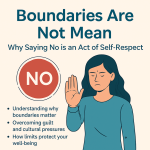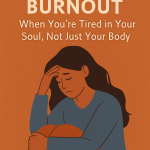What Your Body Might Be Telling You About Stress
We often think of stress as something that exists only in our minds—worry, overthinking, restlessness. But stress lives in the body too. And if you ignore your feelings long enough, your body will start to talk.
In fact, for many people in South Africa and around the world, the body becomes the messenger for emotions they’re not yet ready to face.
🔎 Stress Doesn’t Just Whisper — It Shouts (Eventually)
When emotional stress goes unaddressed, it often shows up in physical ways. You might:
🔴 Struggle with tension headaches or tight shoulders.
🔴 Get stomach problems (bloating, cramps, IBS-like symptoms).
🔴 Wake up feeling tired, no matter how much you sleep.
🔴 Battle with acne, hair loss, or skin flare-ups.
🔴 Experience chest tightness, shortness of breath, or heart palpitations.
These symptoms often go undiagnosed or treated with medication—but the root cause is sometimes emotional, not medical.
💡 Why Your Body Speaks When You Don’t
Our bodies are wired to protect us. When the brain senses emotional danger—whether from burnout, anxiety, grief, or unresolved trauma—it sends signals to the body to prepare for survival.
Over time, this state of hyper-alertness becomes chronic, and the stress hormones like cortisol and adrenaline start to wreak havoc on the nervous system.
You might find yourself asking:
- “Why is my body always tired?”
- “Why do I keep getting sick?”
- “Why can’t I focus or rest properly?”
Your body might be answering with: “Because you’re carrying too much.”
👀 Common Emotions That Get Stored in the Body
Emotions don’t just disappear. If we don’t express them, we suppress them—and that emotional energy needs somewhere to go.
💔 Grief can feel like heaviness in the chest.
🛋️ Anxiety lives in the stomach and jaw.
🚫 Anger often sits in the neck, shoulders, or hands.
😩 Emotional fatigue weighs on your limbs and concentration.
😫 Shame can manifest as stomach knots or tension around the face and neck.
💼 How to Begin Listening to Your Body
If you’re noticing physical symptoms, don’t ignore them.
✔ Slow down and notice what your body is trying to tell you.
✔ Ask yourself: “What am I holding onto emotionally?”
✔ Journal, stretch, breathe deeply, or speak to someone about what’s going on.
✔ Create space for rest without guilt.
✔ If symptoms persist, speak to both a healthcare professional and a mental health professional.
🚀 Final Thought: When You Don’t Speak Your Truth, Your Body Might Speak For You
👉 If you’re tired all the time, in pain, or feeling like something is off—trust your body’s signals.
👉 Don’t wait for things to get worse before you take them seriously.
👉 Sometimes the most important thing you can do is pause and listen.
💙 Therapy can help you explore what you’re carrying emotionally, so your body doesn’t have to hold it all alone.




